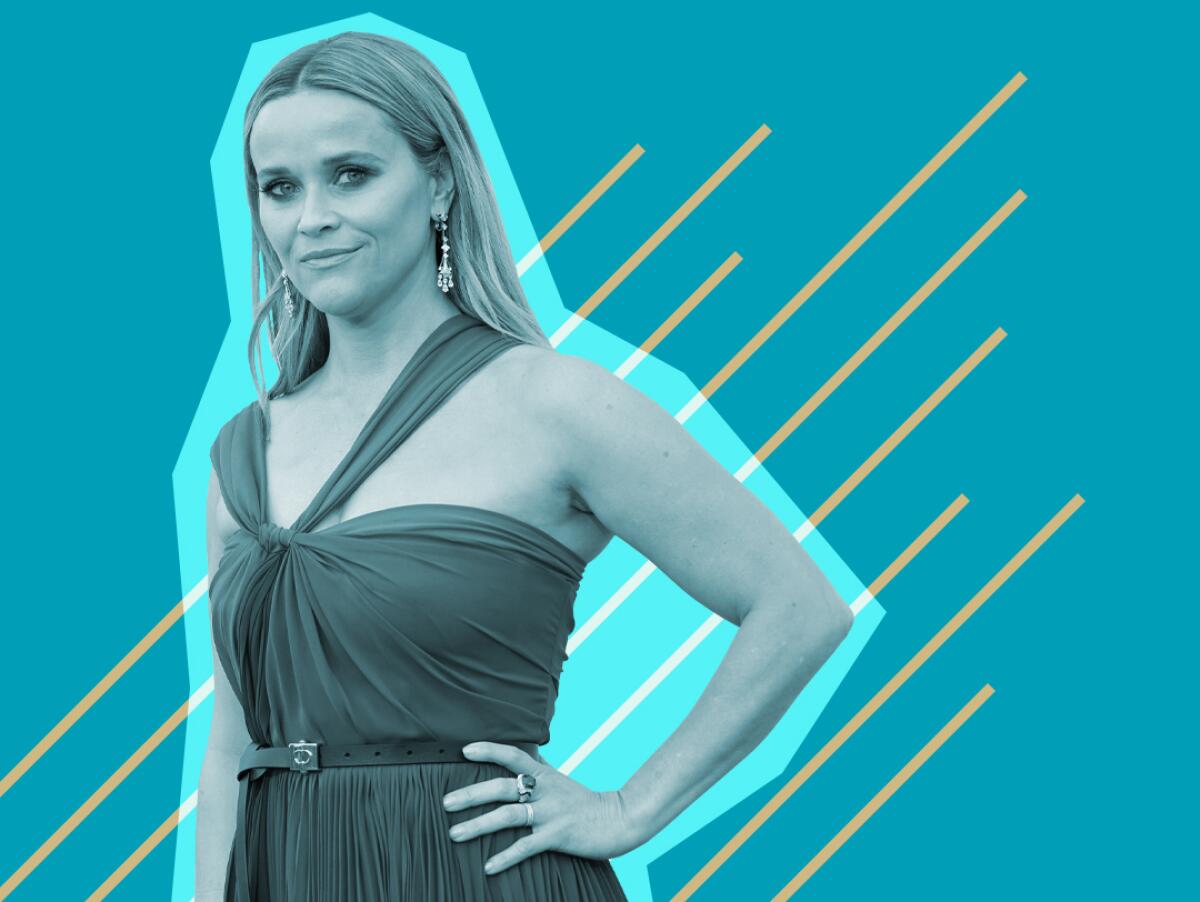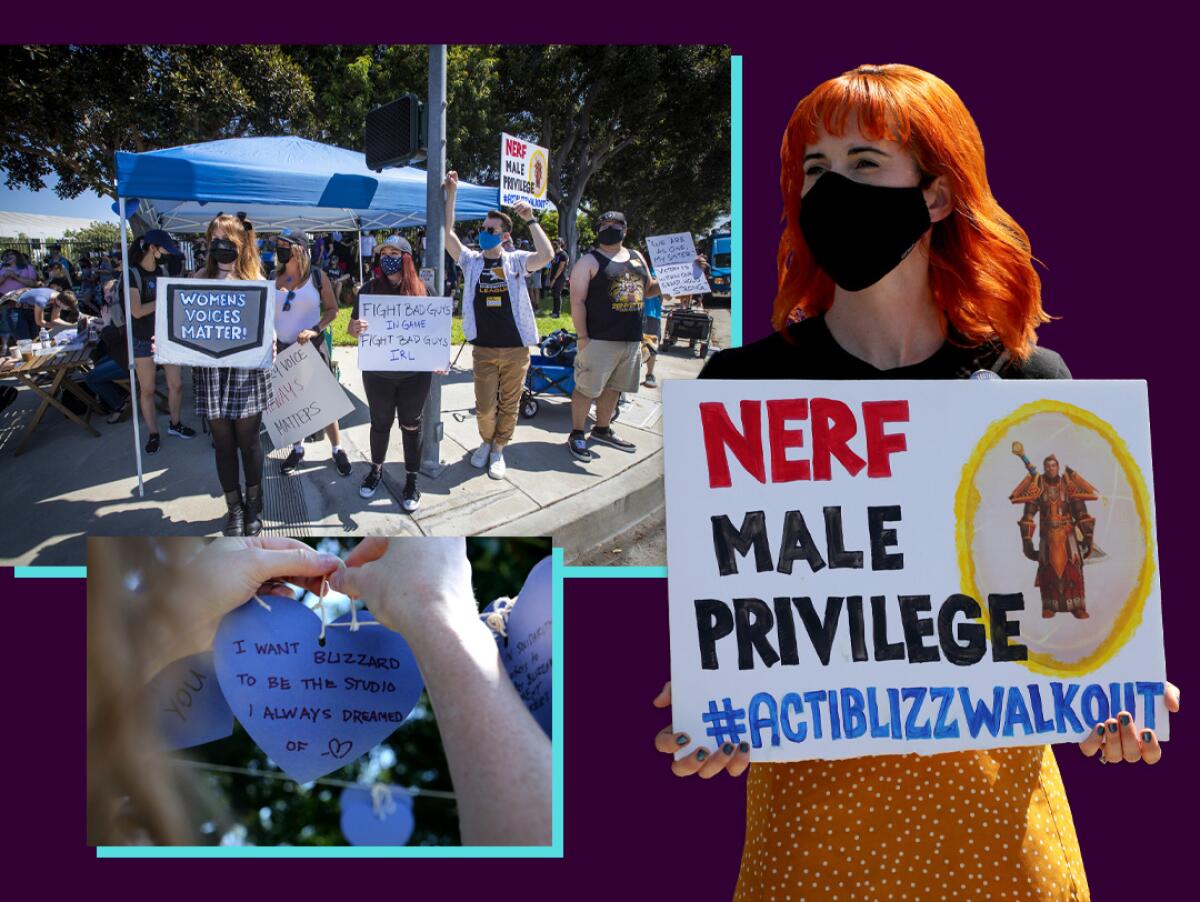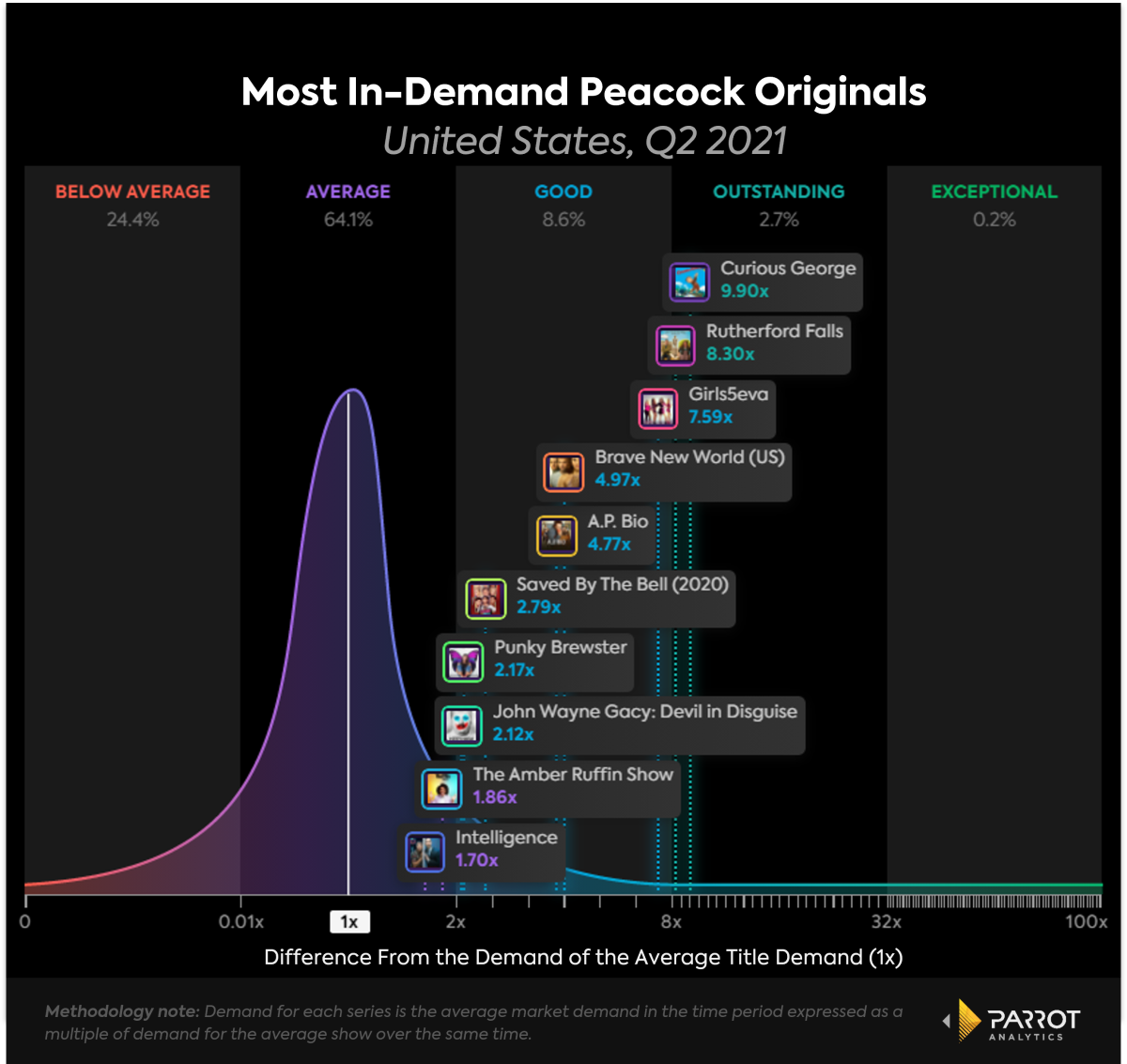Scarlett Johansson vs. Disney: How should talent be paid for streaming?

This is the Aug. 3, 2021, edition of The Wide Shot, a weekly newsletter about everything happening in the business of entertainment. Sign up here to get it in your inbox.
It’s the biggest show in Hollywood: “Suing With the Stars.”
After Scarlett Johansson filed her blockbuster lawsuit against Walt Disney Co. over the online release of “Black Widow,” much of the entertainment media’s focus quickly turned to the war of words between the popular actress’ representatives and the world’s most powerful entertainment company.
Inside the business of entertainment
The Wide Shot brings you news, analysis and insights on everything from streaming wars to production — and what it all means for the future.
You may occasionally receive promotional content from the Los Angeles Times.
Saying there was “no merit whatsoever” to Johansson’s breach of contract claims, Disney went on the attack, citing her $20 million salary for the film, and accused her of “callous disregard” for the effects of the COVID-19 pandemic. Johansson’s longtime agent, CAA partner Bryan Lourd, hit back, saying Disney “shamelessly and falsely accused” her “of being insensitive” to the COVID-19 crisis.
The question of whether Johansson already has enough money is hardly meaningful in this context. More broadly important to the business is how the lawsuit exposed tensions over dramatic long-term changes in the entertainment industry that have converged here in spectacular public fashion.
One is the shifting balance of power between stars and intellectual property, which has become the dominant force of entertainment economics. But the overarching trend is how studios’ streaming strategies, accelerated by the pandemic, have upended the ways in which movies are released and thus how movie stars and filmmakers are paid.
Warner Bros. had to dole out tens of millions to stars after the company said it would release all its 2021 movies on HBO Max and in theaters at the same time. Parent company WarnerMedia compensated some high-profile talent for lost profit participation. That was a short-term solution to a specific problem. But it resembled how Netflix has long opted to pay filmmakers and stars big upfront sums, essentially buying out the “back end” participation the talent might have received from a traditional theatrical release or television run.
The big question is how future contracts will tie success on streaming to compensation for creators. Media company stock prices depend on subscriber numbers, but it’s not as if a filmmaker’s pay is tied to streaming service sign-ups.
“There’s this ongoing erosion of the relationship between the success of the product and the compensation of the artist,” said one top agent, who spoke on condition of anonymity to explain the situation without damaging relationships.
At the core of the Johansson-Disney dispute is changing release patterns. The Mouse House debuted Johansson’s Marvel movie “Black Widow” on Disney+ for a $30 fee at the same time as its theatrical release, rather than waiting the traditional 90 days before sending the film to home video.
Johansson’s team has alleged that Disney broke its contract because Johansson had been promised a release exclusively in theaters. They said the actress was entitled to certain bonuses based on box office performance, which was hampered by the simultaneous release to Disney+. Marvel’s biggest stars typically are rewarded with bonuses when their movie hits certain box office benchmarks.
There’s little doubt that the simultaneous release ate into “Black Widow’s” box office revenue, though how much is unknowable. Johansson’s team reportedly thinks she’s owed $50 million. One agency source said those numbers were based on “pie in the sky” projections, given the effects of the pandemic on box office and the fact that Johansson’s character was killed off in “Avengers: Endgame,” possibly dampening interest.
Additionally, as entertainment attorney and Cinetic Media founder John Sloss points out, the $30 video on-demand sales of “Black Widow” are most likely included in the formula that determines Johansson’s compensation. Sloss said he believes Johansson would have a stronger legal case if Disney had offered “Black Widow” at no additional cost to Disney+ subscribers, similar to WarnerMedia’s move to make Warner Bros.’s 2021 movies available to HBO Max streaming customers for no extra charge.
“When you look at what [WarnerMedia CEO] Jason Kilar did at Warner Bros., he took the entire small screen value and used it to generate subscriptions,” Sloss said. “What Disney did is not that.”
While what WarnerMedia did was arguably more egregious from the perspective of talent, the company quieted the dispute by paying out nearly $300 million to cover would-be profit participation of talent such as Denzel Washington and Will Smith. Essentially WarnerMedia reverse-engineered its way into Netflix’s strategy of paying certain filmmakers top dollar from the jump. Sure, that was after stars and filmmakers cried foul, but it appeared to prevent any lawsuits.
The streaming revolution is the latest example of how changes in technology and business models inevitably lead to tension between studios and talent. The Johansson-Disney dispute also comes as the power of A-list actors fades in favor of intellectual property at the studios and their media conglomerate owners.
This shift was taking place long before streaming became the driving force of studio owners’ stock prices. Before Disney started using Marvel and “Star Wars” to draw audiences to Disney+, marquee-level actors were already taking a back seat to such brands.
With studios seeing more value in established intellectual property than in faces on the movie poster, stars like Johansson go into negotiations with less leverage than they used to. As the theory goes, you’re buying a ticket to see Captain America, not Chris Evans. “Talent does not have the leverage that it used to have,” said one top agent. “And Disney values their IP over everything else. They think the stars are their IP and not individual actors.”

Some actors have gotten ahead of that trend by establishing themselves as creators. Reese Witherspoon sold Hello Sunshine, the production company behind “Big Little Lies” and “The Morning Show,” on Monday for $900 million to a yet-unnamed company backed by Blackstone Group and run by former senior Disney executives Kevin Mayer and Tom Staggs.
Some agents, of course, dispute the notion that stars are losing cultural clout to intellectual property. Marvel isn’t making a lot of movies without big-name stars, after all. Would Black Widow really be the same character without Johansson having played her since “Iron Man 2?”
The ScarJo-Disney dispute will likely end in some kind of settlement. Entertainment industry insiders were nonetheless surprised that Disney struck back so forcefully, and its response struck some as a personal attack on Johansson, prompting activist groups Women in Film, ReFrame and Time’s Up to accuse the company of sexism. A person close to Disney denied it was a personal attack, saying that it was Johansson who sued when the two sides were in negotiations — and when the movie was still in theaters.
A question on everyone’s lips: How did this dispute get so ugly so quickly? Johansson’s lawyers in the lawsuit said she gave Disney ample opportunity to negotiate and was ignored. Whether that’s true will be a key fact in the case. Also relevant is whether Disney’s promise of a “theatrical release” for “Black Widow” means the company had agreed to an “exclusive” theatrical run, as Johansson’s lawyers assert.
It also remains to be seen whether any other stars will follow Johansson’s lead. Dwayne Johnson and Emily Blunt’s “Jungle Cruise” was just released in theaters and on Disney+ simultaneously this past weekend. Globally, it generated $90 million in consumer spending, including $34 million domestically, $27.6 million at the international box office and more than $30 million from Disney+.
Johnson took time to thank fans on Instagram, including those who watched at home on Disney+. At least one star sounds like a happy enough customer.
Stuff we wrote

— Employees at Activision Blizzard walked off the job Wednesday to protest “the company’s response to an explosive lawsuit ... alleging pervasive discrimination and harassment against women,” Sam Dean and Carly Olson reported. California’s Department of Fair Employment and Housing argues in a 29-page lawsuit that the executives of Activision Blizzard grew a “pervasive frat boy workplace culture” and allegedly perpetrated or ignored inequality and sexual harassment.
Allegations of sexism are nothing new in the video game industry. Our games critic Todd Martens previously explained how the suit “makes clear that the video game community can no longer remain under the radar; its boorish, boyish stereotypes, as well as a false reputation as entertainment biz outsiders, are not just outdated but bad for business.” Martens argues that, amid all the strife in Hollywood related to #MeToo, the problems in the video game industry deserve more attention.
— Sign of the times. Netflix quietly joined the Alliance of Motion Picture and Television Producers earlier this year, Anousha Sakoui reports. “The powerful entertainment industry group so far consisted of the traditional studios such as Walt Disney Co. and Warner Bros. as well as Netflix’s tech rivals Amazon and Apple. Netflix had until this year been a notable exception.”
— Prominent ICM partner Steve Alexander departs the Century City-based agency less than three months after allegations about his behavior were raised in a Los Angeles Times investigation by Wendy Lee.
— Dish’s epic battle with HBO is over. The bitter dispute with Dish marked the first — and only — blackout in HBO’s 43-year history and culminated with the long-running outage of the premium channels for more than 2.5 million Dish customers.
Number of the week

It’s been a tough Olympics for Comcast Corp. and its media company, NBCUniversal.
The TV audiences for the Tokyo event have been smaller than anticipated, with prime-time ratings on NBC down nearly 50% compared with the 2016 Olympics in Rio de Janeiro, according to Nielsen data as of last week.
Comcast said it still expects to make a profit from the event. But this is clearly not what the company wanted after spending nearly $8 billion to keep the Olympics broadcast rights through the 2032 Games. Advertisers are talking about “make-goods” from NBC, or ad space provided to compensate for ratings shortfalls.
Many of the issues are beyond the company’s control. An ongoing pandemic, a lack of fans in the crowds and the relative absence of gymnastics star Simone Biles, who figured prominently in NBC’s promotions, didn’t help.
The situation also reflects just how dramatically the media landscape has changed in the last few years. The time difference between Japan and the U.S. would’ve been a problem no matter what. Unlike decades ago though, broadcasters now have to worry about fans waking up to news alerts spoiling key events.
There’s one problem that Comcast could address though — one that was much discussed in my colleagues’ entertaining roundtable discussions of the games. Navigating the multiple Comcast-owned outlets has been a source of frustration. There’s stuff on USA, NBC Sports Network, Golf Channel and, of course, Peacock. For aficionados, it’s never been a better time to watch the Olympics. For a the casual viewer, keeping up can be challenging.
The silver lining is that the Olympics brought eyeballs to Peacock, boosting total signups to 54 million, up from the 42 million it reported previously. Comcast executives have acknowledged only about 14 million of its accounts use the app regularly. That number last month increased to about 20 million monthly active accounts.
But the question is: Will newcomers stick around or even pay for more content? As we noted last time, that will depend on whether newbies are impressed with Peacock’s lineup.
Right now, according to Parrot Analytics, viewers are most interested in the oldies available on Peacock, including “Saturday Night Live” and “The Office.” Demand for originals has been relatively weak.
According to Parrot, “highly in-demand exclusive content, particularly platform originals, are generally what drive new subscribers to sign up for a service. Here Peacock has yet to take off, accounting for just 1.4% of the U.S. digital original demand share in Q2 2021.”
Among Peacock originals, “Curious George,” “Rutherford Falls” and “Girls5eva” were the most “in-demand” programs, according to Parrot, but they were still low compared with shows on other streamers. (NBCUniversal notes that its most recent offering, “Doctor Death,” has been the most popular original series introduced on the year-old service.)

More stories from the week
— Music festivals are dumping DaBaby after the rapper’s homophobic and HIV/AIDS comments. DaBaby on Monday issued an apology for his remarks.
— How TV went from David Brent to Ted Lasso. James Poniewozik chronicles TV’s two-decade shift from the detached irony of the British Ricky Gervais’ version of “The Office” to today’s sincerity. (NYT)
— Brent Lang’s profile of Netflix film chief Scott Stuber highlights the challenges of trying to “convince A-list moviemakers to exchange box office bragging rights for the pleasures of the Netflix ‘top 10.’” A tall order indeed. The piece helps to establish a benchmark for success: “For its bigger films ... Stuber says his team wants them to draw an audience of more than 70 million viewers.” (Variety)
— We’re still getting Woodstock ’99 wrong. Good read from Craig Jenkins on HBO’s documentary about the disastrous festival. (Vulture)
— Amanda Knox in the Atlantic questions why her name keeps coming up around the release of Matt Damon and Tom McCarthy’s “Stillwater” and other cultural touchstones: “Fourteen years ago I was wrongfully convicted of murdering my roommate. Ever since, the world has believed it can tell me who I really am.” Read the essay.
— Speaking of Damon, you’ve got to love a good father-daughter anecdote. Matt Damon says his kid still gives him flack about “The Great Wall.”
Finally...
Comedian Tig Notaro’s “Drawn” would’ve been funny on its own, but her new HBO special goes the extra step of using different styles of animation to bring her stories to life.
Inside the business of entertainment
The Wide Shot brings you news, analysis and insights on everything from streaming wars to production — and what it all means for the future.
You may occasionally receive promotional content from the Los Angeles Times.





